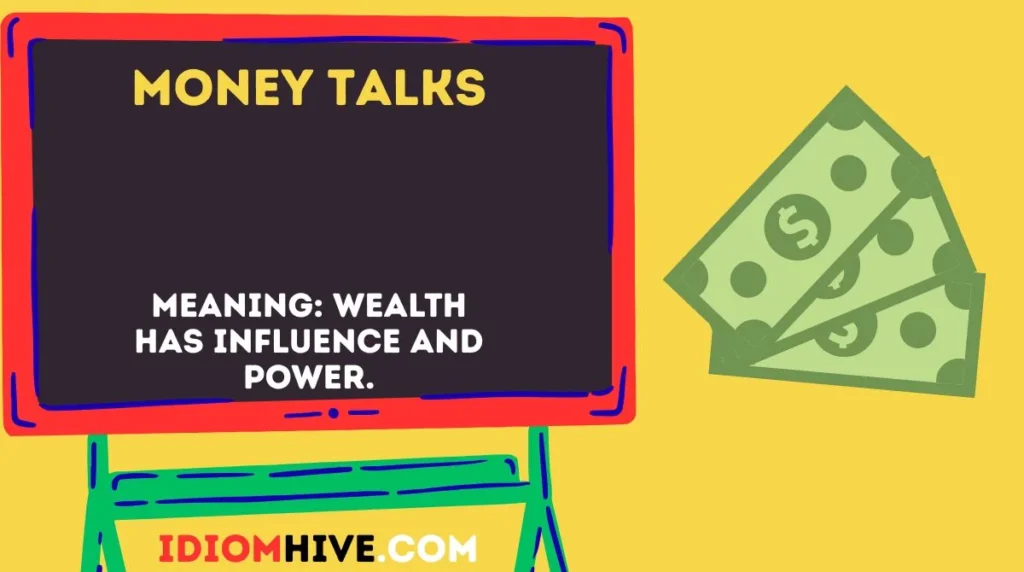Language is full of colorful phrases, and idioms are one of the most fascinating parts of English. An idiom is a group of words that has a meaning different from its literal sense.
For example, when someone says they are “rolling in money,” they don’t mean they are physically lying in a pile of cash—it simply means they are very wealthy.
Idioms for being rich are especially useful because money and success are common topics in everyday conversations.
Whether you’re talking about a wealthy businessperson, describing a lucky win, or expressing dreams of fortune, these idioms bring vividness and personality to your words.
Learning idioms about richness not only helps improve your vocabulary but also makes your English sound more natural, engaging, and close to how native speakers express themselves.
Did You Know?
The English language has over 25,000 idiomatic expressions, and many of them are related to wealth. Interestingly, phrases about being rich often come from history. For example, “born with a silver spoon in one’s mouth” originated in the 18th century, when wealthy families gave silver spoons as baptism gifts to symbolize privilege.
Idioms About Extreme Wealth
Rolling in Money
Meaning: Extremely rich.
Example: “After launching his new company, he’s rolling in money.”
Similar Idiom: Swimming in money.
Note: Informal, used in daily conversations.
Filthy Rich

Meaning: Very wealthy.
Example: “That celebrity is filthy rich from brand endorsements.”
Similar Idiom: Loaded.
Note: Casual, often used when amazed by someone’s wealth.
Loaded
Meaning: Having a lot of money.
Example: “Don’t worry about the bill; he’s loaded.”
Similar Idiom: Well-off.
Note: Common in spoken English, informal tone.
Stinking Rich
Meaning: Extremely wealthy, even to a shocking level.
Example: “The oil tycoon is stinking rich.”
Similar Idiom: Rich as Croesus.
Note: Informal, sometimes said with envy.
Money to Burn
Meaning: Having more money than one needs.
Example: “She has money to burn and spends it on luxury trips.”
Similar Idiom: Deep pockets.
Note: Informal, everyday English.
Sitting on a Goldmine
Meaning: Owning something very valuable.
Example: “With that rare painting, he’s sitting on a goldmine.”
Similar Idiom: Hidden treasure.
Note: Often used in business or investments.
Made of Money
Meaning: Very wealthy.
Example: “He acts like he’s made of money, buying cars every month.”
Similar Idiom: Moneybags.
Note: Informal, often used sarcastically.
Rich as Croesus
Meaning: Extremely wealthy (from the ancient king Croesus).
Example: “The investor is rich as Croesus after selling his shares.”
Similar Idiom: Stinking rich.
Note: Slightly formal, sometimes literary.
Deep Pockets
Meaning: Having a lot of financial resources.
Example: “The company has deep pockets to support research.”
Similar Idiom: Money to burn.
Note: Common in business discussions.
In Clover
Meaning: Living a rich and comfortable life.
Example: “Since retiring, he’s been living in clover.”
Similar Idiom: Living the high life.
Note: Slightly old-fashioned, but still understood.
Idioms About Privilege and Fortune
Born with a Silver Spoon in One’s Mouth
Meaning: Born into a wealthy family.
Example: “She never had to work; she was born with a silver spoon in her mouth.”
Similar Idiom: Privileged background.
Note: Often used critically.
Born into Money
Meaning: Coming from a rich family.
Example: “He was born into money and inherited several estates.”
Similar Idiom: Old money.
Note: Neutral to informal tone.
Old Money

Meaning: Wealth that has been inherited, not newly earned.
Example: “That family is old money; they’ve been rich for centuries.”
Similar Idiom: Blue blood.
Note: Formal, often used socially.
Blue Blood
Meaning: Belonging to a noble or wealthy family.
Example: “She comes from a blue-blood family in Europe.”
Similar Idiom: Upper class.
Note: Formal, historical background.
Born with a Golden Key
Meaning: Born into wealth and privilege.
Example: “He was born with a golden key and never struggled.”
Similar Idiom: Silver spoon.
Note: Less common, poetic.
Upper Crust
Meaning: The wealthy and powerful class of society.
Example: “The event was attended by the upper crust of the city.”
Similar Idiom: Elite.
Note: Slightly formal, often in newspapers.
Fortune Smiled on Someone
Meaning: Luck brought wealth or success.
Example: “Fortune smiled on him when he won the lottery.”
Similar Idiom: Stroke of luck.
Note: Neutral, often in storytelling.
Feather One’s Nest
Meaning: To enrich oneself (often dishonestly).
Example: “He feathered his nest while managing the company.”
Similar Idiom: Line one’s pockets.
Note: Common in political discussions.
Luck of the Draw
Meaning: Gaining wealth by chance.
Example: “Winning that jackpot was just the luck of the draw.”
Similar Idiom: Stroke of luck.
Note: Neutral, casual tone.
Idioms About Spending and Living in Luxury
Live Like a King
Meaning: To live in great luxury.
Example: “After his promotion, he began to live like a king.”
Similar Idiom: Living the high life.
Note: Informal, descriptive.
Living the High Life
Meaning: Enjoying a luxurious lifestyle.
Example: “They’re living the high life on their yacht.”
Similar Idiom: In clover.
Note: Common in casual English.
Champagne Taste on a Beer Budget
Meaning: Wanting to live luxuriously without enough money.
Example: “She has champagne taste on a beer budget.”
Similar Idiom: Living beyond means.
Note: Informal, witty phrase.
Keeping Up with the Joneses
Meaning: Trying to match neighbors’ wealth or lifestyle.
Example: “He bought a new car just to keep up with the Joneses.”
Similar Idiom: Status symbol.
Note: Informal, used in social contexts.
Money Talks

Meaning: Wealth has influence and power.
Example: “In politics, money talks louder than words.”
Similar Idiom: Power of the purse.
Note: Common in professional discussions.
Lavish Lifestyle
Meaning: Spending extravagantly.
Example: “She loves her lavish lifestyle filled with designer clothes.”
Similar Idiom: Extravagant living.
Note: Neutral, descriptive.
Buy Happiness
Meaning: Suggesting money brings comfort or joy.
Example: “They say you can’t buy happiness, but it sure helps.”
Similar Idiom: Money makes the world go round.
Note: Informal, often ironic.
Money Makes the World Go Round
Meaning: Money is essential for everything.
Example: “In business, money makes the world go round.”
Similar Idiom: Cash is king.
Note: Neutral, often used seriously.
Idioms About Earning and Investing Wealth
Cash Cow
Meaning: A business that consistently generates profit.
Example: “That product line is the company’s cash cow.”
Similar Idiom: Goldmine.
Note: Business English, professional.
Golden Goose
Meaning: A source of continuous wealth.
Example: “Don’t kill the golden goose by overusing the brand.”
Similar Idiom: Cash cow.
Note: Business and economics.
Strike It Rich
Meaning: Suddenly become wealthy.
Example: “He struck it rich after selling his app.”
Similar Idiom: Hit the jackpot.
Note: Informal, exciting tone.
Hit the Jackpot
Meaning: To earn a large amount suddenly.
Example: “They hit the jackpot with that invention.”
Similar Idiom: Strike it rich.
Note: Informal, casual English.
Rags to Riches
Meaning: Rising from poverty to wealth.
Example: “His story is a classic rags to riches tale.”
Similar Idiom: Cinderella story.
Note: Common in biographies.
Pay Dividends
Meaning: To bring profit or reward.
Example: “Her investments paid dividends over the years.”
Similar Idiom: Reap rewards.
Note: Business and finance context.
Cash In On
Meaning: To make profit from something.
Example: “He cashed in on the popularity of social media apps.”
Similar Idiom: Capitalize on.
Note: Informal, often business.
Nest Egg
Meaning: Savings set aside for the future.
Example: “They built a nest egg for retirement.”
Similar Idiom: Rainy-day fund.
Note: Informal, family or financial talk.
Golden Handshake
Meaning: A large sum given when leaving a company.
Example: “The CEO left with a golden handshake.”
Similar Idiom: Severance package.
Note: Business/professional.
Pot of Gold
Meaning: A large reward or fortune, often unexpected.
Example: “He chased the deal hoping for a pot of gold.”
Similar Idiom: Treasure trove.
Note: Neutral, often metaphorical.
How to Use These Idioms in Daily Life
Idioms about richness can be used in many situations:
- In speaking: Use casual ones like “loaded” or “money to burn” in friendly chats.
- In writing: Use professional idioms like “deep pockets” or “cash cow” in business emails.
- In stories: Idioms like “rags to riches” or “strike it rich” make storytelling vivid.
To sound natural, mix idioms with regular sentences and use them when the context fits.
Common Mistakes Learners Make With Idioms
- Wrong Literal Use
❌ “He is literally rolling in money.”
✅ “He’s rolling in money after his successful investment.” - Mixing Idioms Incorrectly
❌ “She struck the golden spoon.”
✅ “She was born with a silver spoon in her mouth.” - Overusing Idioms
❌ “He’s loaded, filthy rich, stinking rich, and has money to burn.”
✅ Choose just one idiom: “He’s filthy rich.”
FAQs
1. What does “filthy rich” mean?
It means someone is extremely wealthy, often more than necessary.
2. Can I use idioms in formal writing?
Some, like “deep pockets” or “cash cow,” work in business contexts. Avoid informal ones in academic or official writing.
3. Are idioms about money used worldwide?
Yes, but meanings can vary. English has many wealth idioms, while other languages may have different ones.
4. What is the difference between “old money” and “new money”?
“Old money” refers to inherited wealth, while “new money” refers to self-made or recent wealth.
5. Is it okay to use idioms daily?
Yes, but use them naturally. Too many idioms can make speech confusing.
Conclusion
Idioms about wealth bring life and expression to the English language. From describing someone who is “rolling in money” to telling an inspiring “rags to riches” story, these phrases help you sound more fluent, natural, and creative.
They not only make conversations engaging but also connect you to the cultural and historical richness of English.
Next time you talk about money, wealth, or success, try slipping in one of these idioms—you’ll be surprised how powerful and lively your words can become!










